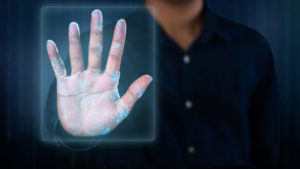Evil Tech? How the Mark of the Beast Could Shape Biometric Regulations

In 2012, coal miner Beverly Butcher was shocked to realize that his employer was playing a direct role in fulfilling biblical prophecy. To the untrained eye, the company’s new hand-scanning system must have seemed completely innocuous. But Butcher knew better. As a devout Christian, he knew that the hand-scanning system was in fact a terrifying sign of the end times, and to participate in the hand-scanning would be to accept the “mark of the beast.”
Butcher didn’t exactly get fired for refusing to use the hand scanner, but he did feel compelled to retire early. This led to a rather entertaining lawsuit brought on Butcher’s behalf by the Equal Employment Opportunity Commission. In 2017 a federal appeals court affirmed a jury award of $586,861 for lost wages. According to the court, for Butcher, “participating in the hand-scanner system would have presented a threat to core religious commitments.”
Butcher isn’t the only Christian to associate biometric technology with the mark of the beast. And the EEOC’s lawsuit is also not an isolated incident of a government body taking mark-of-the-beast fears seriously. Although it’s disheartening to think that a few melodramatic verses in the book of Revelation could end up shaping government regulations, this may in fact be a possibility—especially given the outsized influenced religious fears tend to play in shaping political policies in this country.
For anyone who decides to take it seriously, Revelation is about as ominous a document as history has handed down. From the first passage, it’s a nonstop deluge of nightmarish visions, proclamations, and absurdities. While most of the book is far too abstract to hold the attention of average Christians, there are a few passages that stand out like little Hallmark cards of doom. One such passage, Revelation 13, concerns a certain “beast coming out of the earth” who causes people “to receive a mark in their right hand, or in their foreheads.” And no one can “buy or sell” unless they have the mark.
Theologians may argue about what exactly this means, but to many Christians (including the army of wannabe theologians with YouTube channels), it’s actually quite clear. One day, some authority figure is going to come along and make us all wear some kind of mark (implant?) on the right hand or forehead as a precondition to participating in worldly affairs. But if you get the mark, watch out! You won’t be able to enter God’s kingdom.
So, if you believe this stuff, the stakes are high; you really don’t want to get caught with that mark. As a result, Christian groups have a history of fighting against anything even vaguely falling under the purview of the Revelation 13 mark. For example, the Real ID Act, which mandated a national ID card, caused a real scare in the early 2000s. The Christian website NoNationalID.com (now defunct) created an online petition to oppose the Real ID Act based upon the hype that the national ID was, in fact, the mark of the beast. Another Christian organization, The Family International, was slightly more level-headed about the issue, reasoning, “These ID cards are not the mark of the Beast, as the Bible plainly states that bearers will receive the mark of the Beast in their right hands or on their foreheads.” But wait—they were quick to add, “These ID cards are, however, preparing the way.”
In the natural progression of technology, first came national ID cards, then RFID implants, and now we’re about to enter the era (presumably) of neural lace. Meanwhile, standard biometric technology has become incredibly accurate, widely available, and varied. Technology can now be used to identify individuals by recognizing their face, fingerprint, palm, iris, and voice.
Even putting religious hysteria aside, each new technological advancement in this area does seem legitimately ominous. Practical questions arise: Who owns your biometric data? Can it be collected and sold as big data? How much is it worth? Beyond these questions, more generally, do we really want to live in a world where our faces and irises are scanned indiscriminately at every turn? Or how about a world where you can’t participate in the modern economy unless you agree to have Black Mirror-style eye implants and Elon Musk’s neural lace strapped to your cortex? Maybe that’s not the future we want. But even if we do want that future, we should hope to get there only after laying down sane regulations that aren’t influenced by madcap prophesies from the first century.
This country is full of Beverly Butchers, and they vote. So, it’s almost a guarantee that mark-of-the-beast fears will shape future biometrics policies—at least to the degree that Beverly Butchers are able to win court cases and elect politicians with like-minded fears. As always, the fight at hand isn’t spiritual; it’s simply a matter of voting for politicians with humanist values and helping your devout neighbor read a few centuries beyond Revelation 13.
